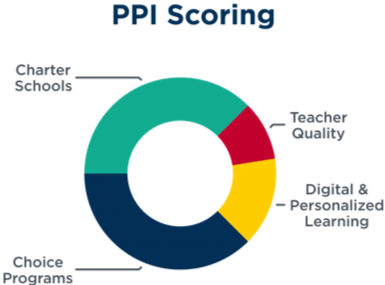2020 Parent Power! Index codifies the realities of system deficiencies.
WASHINGTON, D.C. — With Covid-19’s impact on education a wake-up call for most parents, a new study of state education laws validates the reasons why so many parents are struggling to educate their children. The 2020 Parent Power! Index (PPI) is the most comprehensive analysis of states’ structural and behavioral policies that inform parents and allow them to make decisions regarding the education of their children, within or without any crisis.
 “It shouldn’t take a pandemic to trigger a demand for more and better educational opportunities for our kids,” said Jeanne Allen, the founder and chief executive of the Center for Education Reform, which released today’s study. “But that is precisely what’s happening across the country, as more and more parents find out that their ability to educate their kids is wholly dependent on a limited, finite, and often deficient set of offerings.”
“It shouldn’t take a pandemic to trigger a demand for more and better educational opportunities for our kids,” said Jeanne Allen, the founder and chief executive of the Center for Education Reform, which released today’s study. “But that is precisely what’s happening across the country, as more and more parents find out that their ability to educate their kids is wholly dependent on a limited, finite, and often deficient set of offerings.”
Allen continued, “Educating students outside a classroom requires 21st century innovation. Sadly, such innovation is lacking in all but a few states.”
The Parent Power! Index measures the extent to which each state does four things:
1. | Has policies in place that put students ahead of systems. |
2. | Values the diversity of need and condition of every family. |
3. | Provides vital accessible information. |
4. | Affords parents the power to exercise fundamental decisions regarding how their kids are educated. |
“The Parent Power! Index exists to ensure that any parent, guardian, or caring adult understands how education is shaped, and what they can do to ensure it works for all kids,” said Allen.
Allen concluded: “2020 has been a year of conflict and chaos. By providing substantive information for parents and policymakers, we hope that the Parent Power! Index can guide significant changes in law and behavior — something that most states are typically hesitant to do for fear of offending their friends and colleagues in the status quo.”
CONTACT:
hi@jonathanrick.com
202-596-1882
###
Founded in 1993, the Center for Education Reform aims to expand educational opportunities that lead to improved economic outcomes for all Americans — particularly our youth — ensuring that conditions are ripe for innovation, freedom and flexibility throughout U.S. education.










10 Must-Reads To Bring With You On That Last Beach Trip Before Summer Ends
Summer is full of required reading lists.
While many kids across the U.S. finish up their summer reading as they gear up to go back to school, here’s a list of recommended reading for understanding how we get our schools and learning opportunities to reflect a new opportunity agenda that allows for Innovation and Opportunity to thrive:
1. How The Other Half Learns: Equality, Excellence, and the Battle Over School Choice
by Robert Pondiscio
2. Charting a New Course: The Case for Freedom, Flexibility, and Opportunity Through Charter Schools
Co-Editors: Jeanne Allen, Cara Candal, Max Eden
3. A Nation At Risk
4. The Split Screen Strategy: How to Turn Education Into a Self-Improving System
by Ted Kolderie
5. Zero Chance of Passage: The Pioneering Charter School Story
by Ember Rechgott Junge
6. No Struggle No Progress: A Warrior s Life from Black Power to Education Reform
by Howard Fuller with Lisa Frazier Page
7. Education Reform: Before It Was Cool – The Real Story and The Pioneers Who Made It Happen
edited by Jeanne Allen
8. Unleashing Greatness: 9 Plays to Spark Innovation in Education
by Michael Barber & Joel Klein
9. 2020 Vision: A History of the Future
by the GSV team, led by Michael Moe and Deborah Quazzo
10. Blended: Using Disruptive Innovation to Improve Schools
by Michael B. Horn, Heather Staker, Clayton M. Christensen
Did we miss one? Tweet a suggestion to us @edreform!